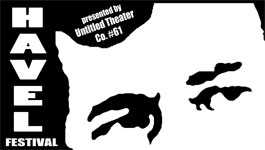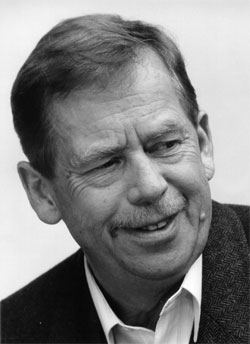|
Václav Havel : A biography
Václav Havel is a playwright, a political dissident, and the former president of the Czech Republic. Deemed “subversive,” his writings (and his name) were banned by the Communists in the 1970s. He became the leader of the revolution that drove them from power, and ultimately, in 1993, president of the newly independent Czech Republic. Václav Havel was born in 1936, during the period of the First Democratic Republic, led by President Masaryk. Havel’s childhood was for the most part carefree, and his love of poetry and ideas was insuppressible—he was photographed lounging on a garden bench as a Roman emperor, with tousled curls and a toga. His prosperous family divided their time between a mansion in Prague (built by his grandfather) and their country estate. His private school education, however, lasted only until he was 12 years old. By then, the Stalinists had begun to strip Czechoslovakia’s property owners of their holdings. He was relegated to a technical school, where he trained as a chemistry lab assistant, but continued his true education and inaugurated a literary magazine in a Café across from the National Theatre. By the mid 1960s, he found work and a collaborative atmosphere at the Theatre on the Balustrade, where his first performed play was The Garden Party (1963), which was characteristic of the humanist literary movement then on the rise in Prague. His early political engagement culminated in the historic Prague Spring of 1968. Following its suppression by the invading armies of the Warsaw Pact, Havel protested the repressive effects of the communist “normalization.” Although his writings were banned after the invasion, his plays spread in samizdat (underground publications) throughout Czechoslovakia, and were also smuggled out of the country and performed all over the world. Perhaps most legendary was a recording of Audience, with Havel and a friend performing the two roles―many in Czechoslovakia could quote it verbatim, although officially it had never been performed. In 1975, he wrote an open letter to President Husák, in which he warned of growing dissent in Czechoslovak society. In January 1977, Charter 77, a manifesto protesting the communist government and its oppressive dictates, was issued; Havel was one of the founders of this initiative. In April 1979, he became a co-founder of the Committee for the Defense of the Unjustly Prosecuted. He was imprisoned three times for “subversion,” and spent nearly five years behind bars. A passionate supporter of nonviolent resistance—his own forms of expression remain plays, letters, and essays—Havel became a leading figure in the Velvet Revolution. On December 29, 1989, as leader of the Civic Forum, he was unanimously voted president of the Federal Assembly. In the free elections of 1990, he was again voted in. With the formation of Czech Republic, he ran for president, and on January 26, 1993, he won. He left office after his second term ended on February 2, 2003. Mr. Havel continues to write and to speak about the humanitarian rights issues that have always concerned him. He is in New York City right now…listening, perhaps, or further refining his views on democracy … in any case, we look forward to his next play.
Click on the topics below for a timeline of Havel’s political and artistic life.
|
Václav Havel’s Office |
||||||||||||||
Sponsored by:
 |
 |
 |

